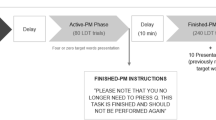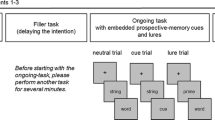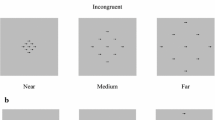Abstract
Prospective memory (PM) represents the ability to remember to perform planned actions after a certain delay. As previous studies suggest that even brief task-delays can negatively affect PM performance, the current study set out to examine whether procrastination (intentionally delaying task execution despite possible negative consequences) may represent a factor contributing to PM failures. Specifically, we assessed procrastination (via a standardized questionnaire as well as an objective behavioral measure) and PM failures (via a naturalistic PM task) in 92 young adults. Results show that participants’ self-reports as well as their actual procrastination behavior predicted the number of PM failures, corroborating the impact of procrastination on PM. Subsequent cluster analyses suggest three distinct procrastination profiles (non-procrastinators, conscious procrastinators and unconscious procrastinators), providing new conceptual insights into different mechanisms of how procrastinating may lead to forgetting to perform planned tasks.


Similar content being viewed by others
Data availability statement
The datasets generated and analyzed for the current study are not publicly available because participant consent forms did not include authorization for public data sharing. However, data are available from the corresponding author on reasonable request.
Notes
An exploratory factor analysis on the PPS self-reports revealed that item 4 did not distinguish between the two dimensions of procrastination (high factor loadings on voluntary (= 0.44) and observed delay (= 0.49); for details, see Zuber et al. (2020). Consequently, item 4 was removed from subsequent analyses.
We thank an anonymous reviewer for suggesting this possibility.
References
Aberle, I., & Kliegel, M. (2010). Time-based prospective memory performance in young children. European Journal of Developmental Psychology, 7(4), 419–431. https://doi.org/10.1080/17405620802507707.
Aberle, I., Rendell, P. G., Rose, N. S., McDaniel, M. A., & Kliegel, M. (2010). The age prospective memory paradox: Young adults may not give their best outside of the lab. Developmental Psychology, 46(6), 1444–1453. https://doi.org/10.1037/A0020718.
Altgassen, M., Scheres, A., & Edel, M.-A. (2019). Prospective memory (partially) mediates the link between ADHD symptoms and procrastination. ADHD Attention Deficit and Hyperactivity Disorders, 11(1), 59–71. https://doi.org/10.1007/s12402-018-0273-x.
Ballhausen, N., Hering, A., Rendell, P. G., & Kliegel, M. (2019a). Prospective Memory across the Lifespan. In J. Rummel & M. A. McDaniel (Eds.), Prospective Memory. London/New York: Taylor & Francis Group.
Ballhausen, N., Kliegel, M., & Rimmele, U. (2019b). Stress and prospective memory: What is the role of cortisol? Neurobiology of Learning and Memory, 161, 169–174. https://doi.org/10.1016/j.nlm.2019.04.010.
Bartlett, M. S. (1937). The statistical conception of mental factors. British Journal of Psychology, 28, 97–104.
Bedard, M., Verma, S., Collins, B., Song, X., & Paquet, L. (2016). Prospective memory impairment in chemotherapy-exposed early breast cancer survivors: Preliminary evidence from a clinical test. Journal of Psychosocial Oncology, 34(4), 291–304. https://doi.org/10.1080/07347332.2016.1181133.
Brandimonte, M. A., Einstein, G. O., & McDaniel, M. A. (1996). Prospective Memory: Theory and Application. Mahwah: Erlbaum.
Burkard, C., Rochat, L., Emmenegger, J., Van der Linden, A. C. J., Gold, G., & Van der Linden, M. (2014). Implementation intentions improve prospective memory and inhibition performances in older adults: The role of visualization. Applied Cognitive Psychology, 28(5), 640–652. https://doi.org/10.1002/acp.3046.
Cauvin, S., Moulin, C., Souchay, C., Schnitzspahn, K., & Kliegel, M. (2019). Laboratory vs. naturalistic prospective memory task predictions: young adults are overconfident outside of the laboratory. Memory, 27(5), 592–602. https://doi.org/10.1080/09658211.2018.1540703.
Chen, Y. Z., Lian, R., Yang, L. X., Liu, J. R., & Meng, Y. F. (2017). Working memory load and reminder effect on event-based prospective memory of high- and low-achieving students in math. Journal of Learning Disabilities, 50(5), 602–608. https://doi.org/10.1177/0022219416668322.
Choi, J. N., & Moran, S. V. (2009). Why not procrastinate? Development and validation of a new active procrastination scale. The Journal of Social Psychology, 149(2), 195–212. https://doi.org/10.3200/SOCP.149.2.195-212.
Chowdhury, S. F., & Pychyl, T. A. (2018). A critique of the construct validity of active procrastination. Personality and Individual Differences, 120, 7–12. https://doi.org/10.1016/j.paid.2017.08.016.
Chu, A. H. C., & Choi, J. N. (2005). Rethinking procrastination: Positive effects of "active" procrastination behavior on attitudes and performance. The Journal of Social Psychology, 145(3), 245–264. https://doi.org/10.3200/SOCP.145.3.245-264.
Clatworthy, J., Buick, D., Hankins, M., Weinman, J., & Horne, R. (2005). The use and reporting of cluster analysis in health psychology: A review. British Journal of Health Psychology, 10(3), 329–358. https://doi.org/10.1348/135910705x25697.
Crovitz, H. F., & Daniel, W. F. (1984). Measurements of everyday memory—Toward the prevention of forgetting. Bulletin of the Psychonomic Society, 22(5), 413–414. Retrieved from %3cGo to ISI%3e://WOS:A1984TV07900012.
DiStefano, C., Zhu, M., & Mîndrilă, D. (2009). Understanding and using factor scores: Considerations for the applied researcher. Practical Assessment, Research & Evaluation, 14(20).
Einstein, G. O., & McDaniel, M. A. (1990). Normal aging and prospective memory. Journal of Experimental Psychology-Learning Memory and Cognition, 16(4), 717–726. https://doi.org/10.1037/0278-7393.16.4.717.
Einstein, G. O., McDaniel, M. A., Manzi, M., Cochran, B., & Baker, M. (2000). Prospective memory and aging: Forgetting intentions over short delays. Psychology and Aging, 15(4), 671–683. https://doi.org/10.1037//0882-7974.15.4.671.
Ferrari, J. R. (2001). Getting things done on time: Conquering procrastination. In C. R. Snyder (Ed.), Coping with stress: Effective people and processes (pp. 30–46). Oxford: Oxford University Press.
Gollwitzer, P. M. (1999). Implementation intentions: Strong effects of simple plans. American Psychologist, 54(7), 493–503. https://doi.org/10.1037/0003-066X.54.7.493.
Gustavson, D. E., & Miyake, A. (2017). Academic procrastination and goal accomplishment: A combined experimental and individual differences investigation. Learning and Individual Differences, 54, 160–172. https://doi.org/10.1016/j.lindif.2017.01.010.
Haas, M., Zuber, S., Kliegel, M., & Ballhausen, N. (2020). Prospective Memory Errors in Everyday Life: Does Instruction Matter? Memory, 28(2), 196–203. https://doi.org/10.1080/09658211.2019.1707227.
Harriott, J., & Ferrari, J. R. (1996). Prevalence of procrastination among samples of adults. Psychological Reports, 78(2), 611–616. https://doi.org/10.2466/pr0.1996.78.2.611.
Henry, J. D., MacLeod, M. S., Phillips, L. H., & Crawford, J. R. (2004). A meta-analytic review of prospective memory and aging. Psychology and Aging, 19(1), 27–39. https://doi.org/10.1037/0882-7974.19.1.27.
Hensley, L. C. (2014). Reconsidering active procrastination: Relations to motivation and achievement in college anatomy. Learning and Individual Differences, 36, 157–164. https://doi.org/10.1016/j.lindif.2014.10.012.
Hering, A., Kliegel, M., Rendell, P. G., Craik, F. I. M., & Rose, N. S. (2018). Prospective memory is a key predictor of functional independence in older adults. Journal of the International Neuropsychological Society, 24(6), 640–645. https://doi.org/10.1017/S1355617718000152.
Hering, A., Phillips, L. H., & Kliegel, M. (2014). Importance effects on age differences in performance in event-based prospective memory. Gerontology, 60(1), 73–78. https://doi.org/10.1159/000355057.
Kelly, A. J., Hertzog, C., Hayes, M. G., & Smith, A. D. (2013). The effects of age and focality on delay-execute prospective memory. Neuropsychology, Development, and Cognition. Section B, Aging, Neuropsychology and Cognition, 20(1), 101–124. https://doi.org/10.1080/13825585.2012.691152.
Kliegel, M., & Jäger, T. (2006). Delayed-execute prospective memory performance: The effects of age and working memory. Developmental Neuropsychology, 30(3), 819–843.
Kliegel, M., Martin, M., McDaniel, M. A., & Einstein, G. O. (2002). Complex prospective memory and executive control of working memory: A process model. Psychologische Beiträge, 22, 303–318.
Kliegel, M., McDaniel, M. A., & Einstein, G. O. (Eds.). (2008). Prospective memory: Cognitive, neuroscience, developmental, and applied perspectives. Mahweh: Lawrence Erlbaum Associates.
Krause, K., & Freund, A. M. (2014). Delay or procrastination—A comparison of self-report and behavioral measures of procrastination and their impact on affective well-being. Personality and Individual Differences, 63, 75–80. https://doi.org/10.1016/j.paid.2014.01.050.
Kroese, F. M., & de Ridder, D. T. D. (2016). Health behaviour procrastination: A novel reasoned route towards self-regulatory failure. Health Psychology Review, 10(3), 313–325. https://doi.org/10.1080/17437199.2015.1116019.
Kuhlmann, B. G. (2019). Metacognition of prospective memory: Will I remember to remember? In J. Rummel & M. A. McDaniel (Eds.), Prospective Memory (pp. 60–77). London: Routledge.
Kvavilashvili, L., & Ellis, J. (1996). Varieties of intention: some distinctions and classifications. In M. Brandimonte, G. O. Einstein, & M. A. McDaniel (Eds.), Prospective memory: Theory and applications. Mahwah: Erlbaum.
Mahy, C. E. V., Moses, L. J., & Kliegel, M. (2014). The impact of age, ongoing task difficulty, and cue salience on preschoolers' prospective memory performance: The role of executive function. Journal of Experimental Child Psychology, 127, 52–64. https://doi.org/10.1016/j.jecp.2014.01.006.
McCrea, S. M., Liberman, N., Trope, Y., & Sherman, S. J. (2008). Construal level and procrastination. Psychological Science, 19(12), 1308–1314. https://doi.org/10.1111/j.1467-9280.2008.02240.x.
McDaniel, M. A., & Einstein, G. O. (2000). Strategic and automatic processes in prospective memory retrieval: A multiprocess framework. Applied Cognitive Psychology, 14, 127–144. https://doi.org/10.1002/acp.775.
McDaniel, M. A., & Einstein, G. O. (2007). Prospective memory: A new research enterprise. In M. A. McDaniel & G. O. Einstein (Eds.), Prospective memory: An overview and synthesis of an emerging field (pp. 1–12). Thousand Oaks: SAGE Publications Inc.
McDaniel, M. A., Einstein, G. O., Stout, A. C., & Morgan, Z. (2003). Aging and maintaining intentions over delays: Do it or lose it. Psychology and Aging, 18(4), 823–835. https://doi.org/10.1037/0882-7974.18.4.823.
McFarland, C. P., & Glisky, E. L. (2011). Implementation intentions and prospective memory among older adults: An investigation of the role of frontal lobe function. Aging Neuropsychology and Cognition, 18(6), 633–652. https://doi.org/10.1080/13825585.2011.613449.
Mioni, G., & Stablum, F. (2014). Monitoring behaviour in a time-based prospective memory task: The involvement of executive functions and time perception. Memory, 22(5), 536–552. https://doi.org/10.1080/09658211.2013.801987.
Nelson, T. O., & Narens, L. (1990). Metamemory: A theoretical framework and new findings. In G. H. Bower (Ed.), Psychology of learning and motivation (Vol. 26, pp. 125–173). New York: Academic Press.
Owens, S. G., Bowman, C. G., & Dill, C. A. (2008). Overcoming procrastination: The effect of implementation intentions. Journal of Applied Social Psychology, 38(2), 366–384. https://doi.org/10.1111/j.1559-1816.2007.00309.x.
Piefke, M., & Glienke, K. (2017). The effects of stress on prospective memory: A systematic review. Psychology & Neuroscience, 10(3), 345–362. https://doi.org/10.1037/pne0000102.
Raskin, S. A., & Sohlberg, M. M. (1996). The efficacy of prospective memory training in two adults with brain injury. Journal of Head Trauma Rehabilitation, 11(3), 32–51. Retrieved from %3cGo to ISI%3e://A1996UP77400007
Rebetez, M. M. L., Rochat, L., Gay, P., & Van der Linden, M. (2014). Validation of a French version of the Pure Procrastination Scale (PPS). Comprehensive Psychiatry, 55(6), 1442–1447. https://doi.org/10.1016/j.comppsych.2014.04.024.
Rendell, P. G., & Thomson, D. M. (1999). Aging and prospective memory: Differences between naturalistic and laboratory tasks. Journals of Gerontology Series B-Psychological Sciences and Social Sciences, 54(4), P256–P269. Retrieved from %3cGo to ISI%3e://000082097400007.
Rotenstein, A., Davis, H. Z., & Tatum, L. (2009). Early birds versus just-in-timers: The effect of procrastination on academic performance of accounting students. Journal of Accounting Education, 27(4), 223–232. https://doi.org/10.1016/j.jaccedu.2010.08.001.
Rummel, J., & Meiser, T. (2013). The role of metacognition in prospective memory: Anticipated task demands influence attention allocation strategies. Consciousness and Cognition, 22(3), 931–943. https://doi.org/10.1016/j.concog.2013.06.006.
Schaper, P., & Grundgeiger, T. (2018). The effect of different distractions on remembering delayed intentions. Memory, 26(2), 154–170. https://doi.org/10.1080/09658211.2017.1339090.
Schmitter-Edgecombe, M., Woo, E., & Greeley, D. R. (2009). Characterizing multiple memory deficits and their relation to everyday functioning in individuals with mild cognitive impairment. Neuropsychology, 23(2), 168–177. https://doi.org/10.1037/a0014186.
Schnitzspahn, K. M., Ihle, A., Henry, J. D., Rendell, P. G., & Kliegel, M. (2011). The age-prospective memory-paradox: An exploration of possible mechanisms. International Psychogeriatrics, 23(4), 583–592. https://doi.org/10.1017/S1041610210001651.
Schraw, G., Wadkins, T., & Olafson, L. (2007). Doing the things we do: A grounded theory of academic procrastination. Journal of Educational Psychology, 99(1), 12–25. https://doi.org/10.1037/0022-0663.99.1.12.
Scullin, M. K., & McDaniel, M. A. (2010). Remembering to execute a goal: Sleep on it! Psychological Science, 21(7), 1028–1035. https://doi.org/10.1177/0956797610373373.
Steel, P. (2007). The nature of procrastination: A meta-analytic and theoretical review of quintessential self-regulatory failure. Psychological Bulletin, 133(1), 65–94. https://doi.org/10.1037/0033-2909.133.1.65.
Steel, P. (2010). Arousal, avoidant and decisional procrastinators: Do they exist? Personality and Individual Differences, 48(8), 926–934. https://doi.org/10.1016/j.paid.2010.02.025.
Steel, P., Brothen, T., & Wambach, C. (2001). Procrastination and personality, performance, and mood. Personality and Individual Differences, 30(1), 95–106. https://doi.org/10.1016/S0191-8869(00)00013-1.
Svartdal, F., Granmo, S., & Færevaag, F. S. (2018). On the behavioral side of procrastination: Exploring behavioral delay in real-life settings. Frontiers in Psychology, 9(746). https://doi.org/10.3389/fpsyg.2018.00746.
Svartdal, F., & Steel, P. (2017). Irrational delay revisited: Examining five procrastination scales in a global sample. Frontiers in Psychology, 8, 1927. https://doi.org/10.3389/fpsyg.2017.01927.
Terry, W. S. (1988). Everyday forgetting—Data from a diary study. Psychological Reports, 62(1), 299–303. Retrieved from %3cGo to ISI%3e://WOS:A1988M391200060.
Woods, S. P., Weinborn, M., Li, Y. Q. R., Hodgson, E., Ng, A. R. J., & Bucks, R. S. (2015). Does prospective memory influence quality of life in community-dwelling older adults? Aging Neuropsychology and Cognition, 22(6), 679–692. https://doi.org/10.1080/13825585.2015.1027651.
Woods, S. P., Weinborn, M., Velnoweth, A., Rooney, A., & Bucks, R. S. (2012). Memory for intentions is uniquely associated with instrumental activities of daily living in healthy older adults. Journal of the International Neuropsychological Society, 18(1), 134–138. https://doi.org/10.1017/S1355617711001263.
Zeintl, M., Kliegel, M., Rast, P., & Zimprich, D. (2006). Prospective memory complaints can be predicted by prospective memory performance in older adults. Dementia and Geriatric Cognitive Disorders, 22(3), 209–215. https://doi.org/10.1159/000094915.
Zimmermann, T. D., & Meier, B. (2010). The effect of implementation intentions on prospective memory performance across the lifespan. Applied Cognitive Psychology, 24(5), 645–658. https://doi.org/10.1002/Acp.1576.
Zuber, S., Cauvin, S., Haas, M., Daviet, A.-S., Da Silva Coelho, C., & Kliegel, M. (2020). Do self-reports of procrastination predict actual behavior? (manuscript in preparation).
Zuber, S., & Kliegel, M. (in press). Prospective memory development across the lifespan: An integrative framework. European Psychologist.
Zuber, S., Kliegel, M., & Ihle, A. (2016). An individual difference perspective on focal versus nonfocal prospective memory. Memory & Cognition, 44(8), 1192–1203. https://doi.org/10.3758/s13421-016-0628-5.
Acknowledgements
We thank Iasmin Barbosa and Jessica Carbel for help with data collection. We also thank Morgane Budry for help with data preparation and literature research. The authors acknowledge funding from the Swiss National Centre of Competence in Research LIVES – Overcoming vulnerability: Life course perspectives (NCCR LIVES) and the Swiss National Science Foundation (SNSF).
Funding
This study was funded by the Swiss National Centre of Competence in Research LIVES – Overcoming vulnerability: Life course perspectives (NCCR LIVES) and the Swiss National Science Foundation (SNSF).
Author information
Authors and Affiliations
Corresponding author
Ethics declarations
Conflict of Interest
All authors declare that they have no conflict of interest.
Ethical approval
All procedures performed in studies involving human participants were in accordance with the ethical standards of the institutional and/or national research committee and with the 1964 Helsinki Declaration and its later amendments or comparable ethical standards.
Informed consent
Informed consent was obtained from all individual participants included in the study.
Additional information
Publisher's Note
Springer Nature remains neutral with regard to jurisdictional claims in published maps and institutional affiliations.
Rights and permissions
About this article
Cite this article
Zuber, S., Ballhausen, N., Haas, M. et al. I could do it now, but I’d rather (forget to) do it later: examining links between procrastination and prospective memory failures. Psychological Research 85, 1602–1612 (2021). https://doi.org/10.1007/s00426-020-01357-6
Received:
Accepted:
Published:
Issue Date:
DOI: https://doi.org/10.1007/s00426-020-01357-6




